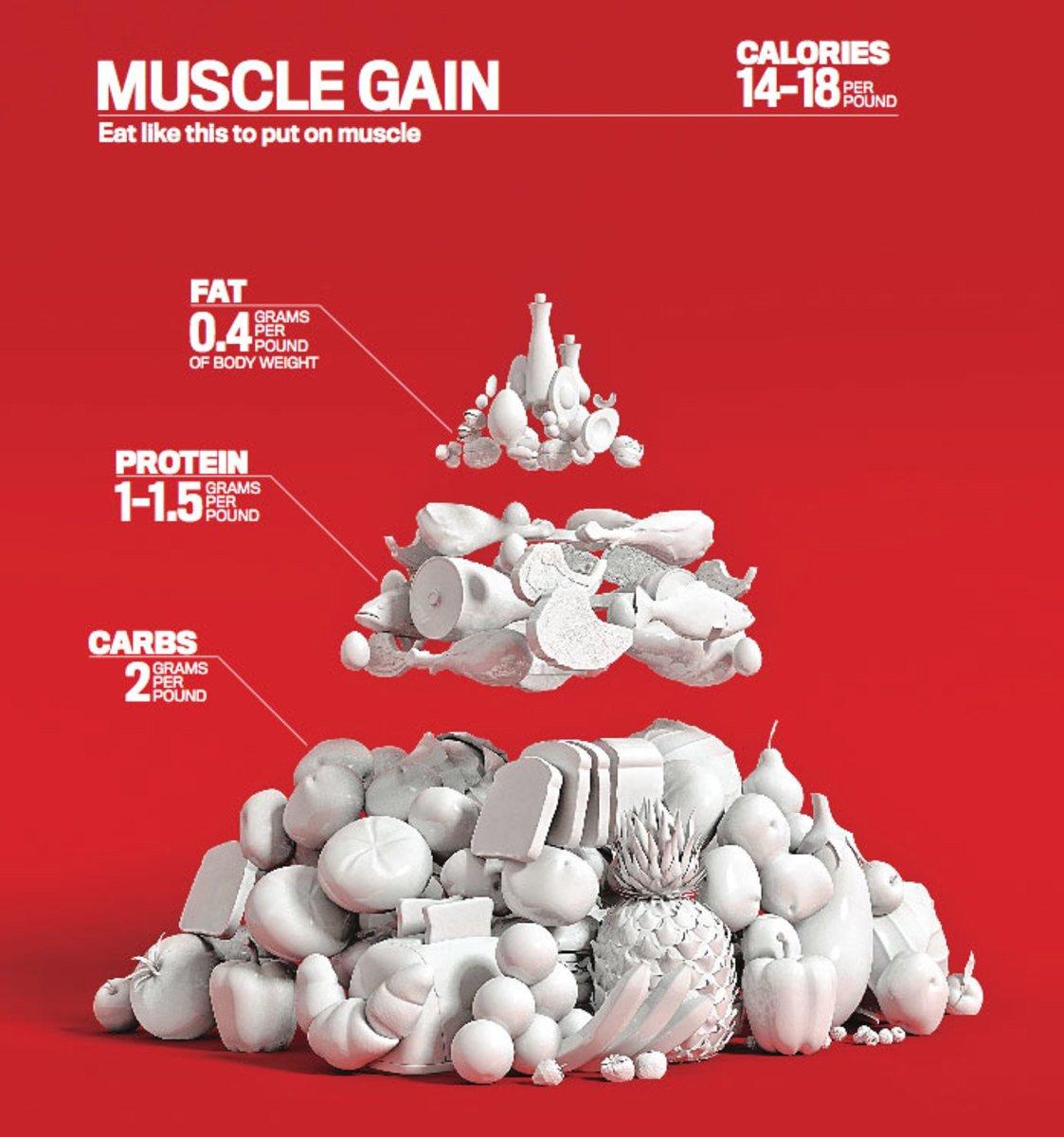An all-out attack on muscle mass can easily fail if you don’t prioritize your nutrition correctly.
If you decide to seriously gain muscle, first of all adjust your diet. Unfortunately, many take this truism literally and, with unhealthy fanaticism, begin to calculate the number of calories consumed or fuss over how much creatine to pour into a teaspoon – with or without a slide, when to drink a protein shake – exactly 30 minutes after training or after 35?
In fact, all these little things only rattle the nervous system and solve absolutely nothing. Remember: the secret to the success of any enterprise, including diet, is a clear plan of action, with clearly defined priorities, i.e. how critical this or that action is for achieving the goal. Therefore, never bother your head with the intricacies of diet. It’s too much! The main thing is to follow the basic rules of nutrition in general. And without fanaticism, but with a clear understanding of the role each of them plays for muscle growth. That is why we presented our set of rules in the form of a pyramid.
IDEOLOGY OF THE PYRAMID
Our growth pyramid is built from blocks of recommendations, which are placed according to the degree of importance of each of them to stimulate muscle growth. The most important ones are at the top, the less important ones are at the bottom. The higher the priority of a particular rule, the more responsible you are in its implementation. The lower, the less worry if for one reason or another you were unable to do what this rule prescribes.
1) CALORIES
The vast majority of athletes during the period of mass gain for some reason rely on specific supplements or pharmaceuticals that stimulate muscle growth. This is a big misconception. Calories or energy is what really plays first fiddle in the overture called “mass building.” It is a high-calorie diet that is the decisive factor without which muscle growth is simply impossible.
Judge for yourself, to make your muscles grow, you need to “charge” with energy not one, but two energy-intensive processes – muscle recovery after stress caused by training, and protein synthesis, due to which muscle fibers will increase in size.
Rule of growth
» Every day, add 32-40 kcal per kilogram of body weight. Example: to make muscles grow, a man weighing 85 kg needs to eat 2800-3500 kcal per day.
2) PROTEIN
As you know, muscle fibers consist of protein, which, in turn, is a chain of amino acids. These are a kind of building bricks from which all muscles are “constructed”. The larger the structure you want to create, the more bricks you will need!
It’s the same with muscles – if you want them to become bigger, take more protein and amino acids. Do not forget that amino acids are an extremely “fragile” building material. If the body experiences a shortage of energy, it immediately goes into energy production. On the other hand, by providing yourself with plenty of energy, but not getting enough protein, you simply deprive your muscles of building material for the reconstruction of muscle fibers.
Rule of Growth
» Try to consume 2 grams of protein per kilogram of body weight daily. If this does not help, that is, muscles do not grow, despite the fact that you are getting the required number of calories, increase your daily protein intake to 2.5 g per 1 kg of body weight. Load up on chicken, lean meats, egg whites, low-fat dairy products and, of course, drink protein shakes.
3) CARBOHYDRATES
Glycogen is, by and large, what carbohydrates are for. Any carbohydrate is broken down into simple saccharides and then “drained” into the blood in the form of glucose, which is subsequently used by muscles, brain and other tissues as a source of quick energy. Unclaimed glucose is stored in the body in the form of glycogen, which is precisely the primary reserve source of energy to ensure all biochemical processes occurring in the body.
Research has proven that the intensity of your workout directly depends on your glycogen stores. The more glycogen stores are filled, the greater the load the muscles can overcome, and vice versa, the poorer the glycogen stores, the harder it is to work in the gym.
On the other hand, “it’s too unhealthy”: if glycogen stores are filled to capacity, then the carbohydrates entering the body begin to turn into fat deposits.
Rule of Growth
» Consume 5 grams of carbohydrates for every kilogram of your body weight daily.
If you have a very fast metabolism, increase your daily carbohydrate intake to 6-10 g per 1 kg of your body weight. Example: To keep glycogen tanks always full, a 100-pound athlete would need to consume about 500 grams of carbohydrates every day.
4) NUTRITION BEFORE TRAINING
By and large, strength training is a big paradox. On the one hand, it stimulates muscle growth, forcing the body to reconstruct muscle fibers by adding new amino acids to them. But on the other hand, training is a real stress for the body, accompanied by strong catabolic processes that destroy the proteins of muscle tissue, “splitting off” amino acids from them.
In truth, it is simply impossible to “kill in the bud” these negative processes, however, they can (and even need to!) be significantly slowed down. And all it takes is loading up on the right amount of pre-workout nutrients.
Rule 45 minutes before training, drink a protein shake containing 40 g of whey protein with a bun or low-fat muffin. These quickly digestible protein and carbohydrates will significantly reduce the effect of catabolic processes on the muscles. 5) POST-WORKOUT NUTRITION What you refuel with immediately after your workout is of great importance for muscle growth. After all, training significantly depleted glycogen reserves and partially destroyed muscle fibers. Now you need to put everything back – fill the glycogen stores and provide the muscles with the necessary building material in the form of amino acids. In other words, you need to do everything possible to overcome the crisis caused by increased nutrient consumption during exercise. Rule of growth » Within half an hour after training, you need to “throw” 70-90 g of carbohydrates into the body (oatmeal, grape juice, white bread with honey or white rice with raisins are suitable) plus 30-45 g of quickly digestible proteins (whey protein shake, egg whites or fish). In principle, all this can be obtained by drinking a protein-carbohydrate cocktail, where the ratio of proteins: carbohydrates = 1:2. 6) FREQUENCY OF FOOD If you continue to eat twice a day – morning and evening, then even if you fully follow all our rules, you are unlikely to gain at least one kilogram of muscle in six months.
Muscles grow only when anabolic processes (protein synthesis) in the body prevail over catabolic ones (protein breakdown). This condition can only be ensured by constantly feeding the body with the necessary nutrients!
In other words, eat as often as possible. Aim to fuel your body every three hours. It is 3 hours after eating that the turning point comes when glycogen reserves are depleted and your energy level reaches that critical point after which the body begins to “eat” muscles. In addition, frequent meals (5-6 meals a day) speed up metabolism, improve digestion and help fight fat deposits very effectively.
Rule of growth
: Eat often, 6 times a day. Each meal should be complete, i.e. portions should be medium in size. However, this does not mean that you should consume exclusively natural products all 6 times a day. 1-3 meals can be replaced with a protein-carbohydrate cocktail, in which the protein:carbohydrate ratio = 1:3 or 1:2.
7) ESSENTIAL FATTY ACIDS
Fats and body fat are not the same thing! And essential fatty acids, or, as they are also called, Omega-3 fats, are simply necessary for muscle growth. They support the normal functioning of the immune system, which repairs muscles and joints after exercise.
These healthy fats also help form glycogen and raise prostaglandin levels (a hormone-like substance that speeds up muscle recovery and growth). The best sources of Omega-3 fats are salmon, mackerel, cod, sardines, flaxseed oil, walnuts and pumpkin seeds.
Rule of Growth
» When preparing steamed vegetables or salad, add 2 tablespoons of cold-pressed vegetable oil, or treat yourself to walnuts daily.
 WATER
WATER
It’s hard to believe that the seven-time Mr. Olympia Ronnie Coleman , with his rock-hard muscles, is 60% water. However, this is a fact!
Water is the basis of life; without it, not a single biochemical process occurs in the body. Water circulates blood throughout your body and fills your muscles with nutrients while flushing out toxins.
Dehydration (dehydration) of the body inhibits metabolism, which indirectly slows down muscle growth. The more the muscles are filled with water, the more active the anabolic processes occur. growth rule It is usually recommended to drink up to 8 glasses of water a day, but if you exercise regularly, then this norm can and should be doubled or more.
9) CREATINE
It’s as simple as that: take creatine– you become stronger. This miracle supplement increases muscle phospho-creatine, the energy source used to contract muscles in the first place. By increasing the level of creatine phosphate, you thereby “recharge” your muscles with an additional charge of energy, which means they become stronger and more resilient.
What follows from this? You get the opportunity to increase the total weight of “processed” iron during training. And this, as you know, is the main stimulus for muscle growth. In addition, creatine increases the saturation of muscle cells with water, which accelerates all biochemical processes in the cell.
Rule of Growth
» Take 5 grams of creatine along with a protein-carbohydrate shake after training. Carbohydrates speed up the delivery of creatine to the muscles.
10) GLUTAMINE
During intense physical activity, the immune system works to the limit, since it is responsible for the recovery of the mouse. And this is where glutamine comes to the rescue . This amino acid strengthens the immune system, helping it work at increased speed. In addition, glutamine stimulates the production of growth hormone, increases glycogen reserves and, most importantly, is the main amino acid in the protein structure of muscle tissue (in relation to all the amino acids that make up the molecule of this protein, the share of glutamine is 60%)
Growth Rule
» Take 5 -10 grams of glutamine before training plus 5-10 grams after training, washed down with a protein-carbohydrate cocktail.
THE MAGIC OF THE PYRAMID
Start by following the rules that are located at the top, and slowly move down. Remember: by ignoring any rule, you are slowing down muscle growth. Moreover, the higher the rules, the more tangible the consequences. Be patient, the results will only be fully realized when all 10 “building blocks of growth” are firmly integrated into your diet!







